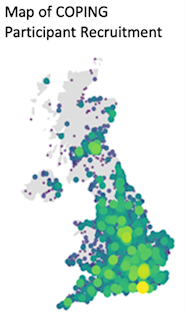Rapid response assessment of mental health in the pandemic
The COVID-19 pandemic posed urgent new challenges to physical health, mental health and how healthcare is provided.
Our research is beginning to report on the early pandemic effects, but 18 months later we can now also begin to understand its long-term effects. Our unique UK-wide study, focusing on mental and neurological health, is ideally placed to answer both the short- and long-term questions about the pandemic effects on the brain, body and behaviour.
We utilised our unique and hugely efficient Feasibility and Acceptability Support Team for Researchers (FAST-R) protocol review by a panel of volunteers with lived experience of diverse mental health issues. By doing this, we gained valuable suggestions and feedback on the language to use and on questions we were asking of participants.
COVID-19 Psychiatry and Neurological Genetics (COPING) Study
The COVID-19 Psychiatry and Neurological Genetics (COPING) Study enrolled 30,450 new and existing National Institute for Health Research (NIHR) Mental Health Bioresource volunteers from across the country. These included 15,826 NIHR Bioresource general population volunteers, and 14,625 volunteers with a current or previous psychiatric diagnosis from the NIHR Mental Health BioResource. This included 909 volunteers from the UK Eating Disorder Genetics Initiative, and 13,716 volunteers from the Genetics Links to Anxiety and Depression study.
COPING assessed the mental health impact of the pandemic 17 times since May 2020 and is unique as it provides pre-pandemic in-depth assessment of mental health in many severe cases of depression, anxiety and eating disorders, alongside genetic data. COPING regularly provides updates to the Department of Health and Social Care, contributing to government policy planning for the pandemic. Our initial analyses revealed that those with comorbid severe anxiety and depression, eating disorders and younger people are among those most severely affected.
COPING was one of many studies invited to take part in the UK Longitudinal Linkage Collaboration (LLC), a national research collaborative effort for collating and harmonising COVID-19 related data from studies that are repeatedly assessing participants over time. Because it included >14,000 previously diagnosed severe cases of mental illness, COPING is highly complementary to the other cohorts in the study. The UK LLC is part of The Longitudinal Health & Wealth National Core Study which has been commissioned by the UK Chief Scientific Advisory and Chief Medical Officer to investigate COVID-19 questions of critical importance.
IMPACT AREAS:
Developing Resources for Research | Whole Person Care | Involving Patients in Research | National and International Collaboration








